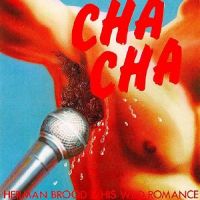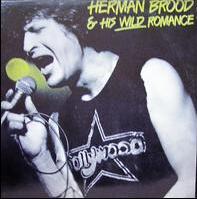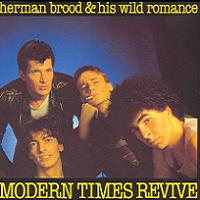
Hermanus "Herman" Brood was a Dutch musician and painter. As a musician he achieved artistic and commercial success in the 1970s and 1980s, and was called "the greatest and only Dutch rock 'n' roll star". Later in life he started a successful career as a painter.

Shpritsz is the second studio album by Dutch rock and roll and blues group Herman Brood & His Wild Romance. The album produced two singles. The first, "Rock & Roll Junkie," did not chart. The second, "Saturday Night," charted in Europe and the United States. On the Dutch album chart, the album reached #8 on 3 June 1978, and stayed on the chart for 28 weeks. It was certified gold in 1978, and platinum in 1980.

Street is the first studio album by Dutch rock and roll and blues group Herman Brood & His Wild Romance, and the start of a solo career for Herman Brood, who had earlier toured and recorded with Cuby and the Blizzards and made one record with the short-lived band Stud. Commercially, it was not very successful: on the Dutch album chart, it reached #30 on 28 May 1977 and stayed on the chart for 7 weeks. The record was re-released on CD in 1995 by Sony BMG/Ariola.

Cha Cha is the first live album by Dutch rock and roll and blues group Herman Brood & His Wild Romance. The album produced one single, "Still Believe." On the Dutch album chart, the album reached #2 on 13 January 1979, and stayed on the chart for 18 weeks. The album was certified gold in 1979.

Go Nutz is the third studio album by Dutch rock and roll and blues group Herman Brood & His Wild Romance. Three singles came from the album, "Love You Like I Love Myself," "Hot Shot," and "I Don't Need You," all of which charted in the Netherlands. On the Dutch album chart, the album reached #6 on 8 March 1980, and stayed on the chart for nine weeks.

Herman Brood & His Wild Romance is an export album by Dutch rock and roll and blues group Herman Brood & His Wild Romance. Released only in the United States, it contained most of the songs from his second studio album, Shpritsz. The main differences between the two albums were omission of the song "One", slightly modified times and track order, and the U.S. single version of "Saturday Night" which features different lyrics from the original version. The album was a moderate success, reaching #122 on the Billboard chart for pop albums. As a result, Brood sought to open up the American market, recording the follow-up, Go Nutz, in the US.

Cha Cha is the soundtrack to the 1979 Dutch film Cha Cha, written by Herman Brood and directed by Herbert Curiel. It features songs by Herman Brood and his band The Wild Romance, Nina Hagen, Lene Lovich, Les Chappell, and others.

Dany "Danny" Lademacher is a Belgian guitar player.

Modern Times Revive is the fifth studio album by Dutch rock and roll and blues group Herman Brood & His Wild Romance. The Wild Romance fell apart after Go Nutz and Wait a Minute; the "new" Wild Romance featured David Hollestelle on guitar. The album was produced by Rinus Gerritsen of Golden Earring.

Frisz & Sympatisz is the sixth studio album by Dutch rock and roll and blues group Herman Brood & His Wild Romance. The album was produced by Tom Barlage.

The Brood is the seventh studio album by Dutch rock and roll and blues group Herman Brood & His Wild Romance. The album reached #22 on the Dutch album chart on 16 June 1984, and stayed on the chart for 17 weeks.

Bühnensucht is a live album by Dutch rock and roll and blues group Herman Brood & His Wild Romance. The album reached No.41 on the Dutch album chart on 5 October 1985, and stayed on the chart for six weeks.

Yada Yada is the eighth studio album by Dutch rock and roll and blues group Herman Brood & His Wild Romance. The album, produced by George Kooymans of Golden Earring, was one of many moderately successful albums by Brood in the mid 1980s; it reached #9 on the Dutch album chart on 19 March 1988, and stayed on the chart for 14 weeks.

Hooks is the ninth studio album by the Dutch rock and roll and blues group Herman Brood & His Wild Romance. The album reached #28 on the Dutch album chart on 17 June 1989, and stayed on the chart for 10 weeks. Both of the early Wild Romance guitarists, Danny Lademacher and David Hollestelle, play on Hooks.

Freeze is the tenth studio album by Dutch rock and roll and blues group Herman Brood & His Wild Romance. The album reached #63 on the Dutch album chart on 3 November 1990, and stayed on the chart for 5 weeks. Brood, who had just won the 1989 Popprijs, one of the highest Dutch awards for popular music, recorded Freeze with the help of Clarence Clemons of the E Street Band and Tejano accordion player Flaco Jiménez. Lack of success for this album leads Brood to stop touring.

My Way is a posthumous compilation album with music by Dutch rock and roll and blues artist Herman Brood, released shortly after his suicide on 11 July 2001. The album produced a number one single, the first of Brood's career: "My Way" reached number one on 18 August 2001. On the Dutch album chart, the album reached #5 on 20 October 2001, and stayed on the chart for 57 weeks. It was certified gold in 2002.

"Dracula"/"The Rose" is a 7" single by Dutch rock and roll band Claw Boys Claw. "Dracula" had earlier been released on the Hitkillers album, a collection of covers of Dutch hits from the 1960s and 1970s. The B-side, "The Rose," was recorded in 1988 but never released. On 25 March 1989, "Dracula" reached #85 on the Dutch charts, where it spent a total of 4 weeks.

Hitkillers/The Beast of Claw Boys Claw is a compilation album by Dutch rock and roll band Claw Boys Claw. The album, released on CD only, combines their fourth studio album Hitkillers and a selection of earlier songs, re-recorded and remixed.
Wild Romance, also known as The Wild Romance, but best known as Herman Brood & his Wild Romance was the backing band of Dutch singer-pianist Herman Brood.
Wild Romance is a 2006 Dutch biopic about Dutch singer and artist Herman Brood. It follows the previous films depicting Brood, the 1979 feature film Cha Cha and the 1994 documentary Rock n Roll Junkie. Named for Brood's backing band, the film received its premiere on the day that Brood would have turned 60 on November 5, 2006.





















